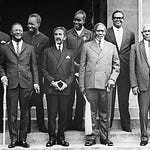Britain’s role in the food shortages that impacted Kwame Nkrumah’s regime is tied to its broader economic and political influence over Ghana during the mid-1960s, though the idea that Britain explicitly "stopped the importation of wheat" seems more anecdotal than directly substantiated by historical records. Let’s break it down with what’s known.
Ghana, as a former British colony (independent since 1957), remained economically tethered to Britain through trade networks, currency (initially tied to the sterling zone), and reliance on imports for staples like wheat, which Ghana didn’t produce in significant quantities. Nkrumah’s government sought to reduce this dependency, pushing for industrialization and agricultural self-sufficiency, but these efforts took time and resources, leaving Ghana vulnerable in the interim. By the early 1960s, his administration faced mounting economic difficulties: declining cocoa revenues (a British-dominated market), foreign debt, and inflation, all of which strained the country’s ability to import food.
Food shortages, including wheat-based products like bread, became a visible problem during Nkrumah’s later years in power. Wheat wasn’t a traditional staple in Ghana—yams, cassava, and maize were more central—but urban populations, especially in Accra, had grown accustomed to bread and other imported goods under colonial influence. When shortages hit, they symbolized broader economic woes. There’s no definitive evidence that Britain deliberately halted wheat imports as a targeted policy to undermine Nkrumah. However, Britain did play a role in the economic pressures that exacerbated these shortages.
One key factor was cocoa, Ghana’s economic backbone. Britain, as a major buyer through its confectionery industry, benefited from keeping cocoa prices low. By the early 1960s, global cocoa prices slumped, partly due to oversupply and market dynamics influenced by Western buyers, including British firms. This slashed Ghana’s foreign exchange reserves, limiting its ability to pay for imports like wheat. Nkrumah accused Western powers, including Britain, of manipulating commodity markets to weaken anti-colonial regimes—a charge he laid out in Neo-Colonialism: The Last Stage of Imperialism. While not a direct “wheat embargo,” this economic squeeze indirectly hampered food imports.
Politically, Britain had a vested interest in Nkrumah’s downfall. His socialist policies, nationalization of industries (some British-owned), and alignment with the Soviet bloc irked London. British intelligence, alongside the CIA, reportedly supported anti-Nkrumah factions, though declassified specifics are murky. The food shortages, including wheat scarcity, fueled public discontent—queues for bread and price hikes became rallying points for opposition groups like the United Party, which had ties to Western interests. Britain didn’t need to “stop wheat” explicitly; the economic stranglehold it helped maintain did enough damage.
The wheat story might stem from specific incidents—like trade disputes or delays in shipments—that got amplified in popular memory. For instance, in 1965, Ghana faced acute shortages of flour and bread, blamed on import bottlenecks and foreign exchange shortages. Some accounts suggest British firms or banks, holding Ghana’s debts, tightened credit lines, slowing food imports. But this was less a dramatic “stoppage” and more a byproduct of neo-colonial leverage.
In short, Britain’s role in Ghana’s food shortages under Nkrumah wasn’t a simple case of cutting off wheat but part of a broader economic and political strategy. By keeping Ghana dependent on a faltering cocoa economy and supporting conditions for instability, Britain contributed to the crisis that weakened Nkrumah, paving the way for the 1966 coup. Food, including wheat, was a symptom of that deeper power play.
Great perspective from Professor Agyeman Badu Akosa on how Tony Ben perceived the late Kwame Nkrumah. A testament to his ingenuity and brilliance as African leader to be emulated.
#Africa #Africadiaspora #AlkebulanAwakening #DecolonizeOurMinds #AfricaUnchained #AlkebulanUnity #DecolonizeAfrica #AlkebulanRenaissance #Africanhistory #Africanstories #ReclaimingNarratives #TellingOurStories












Share this post